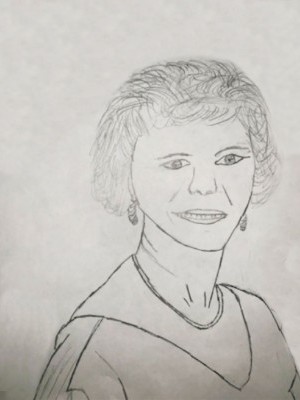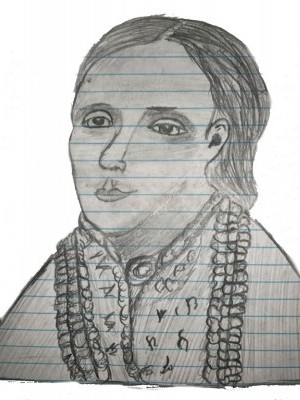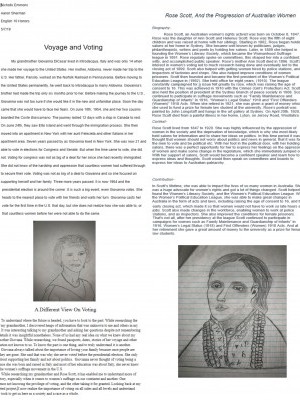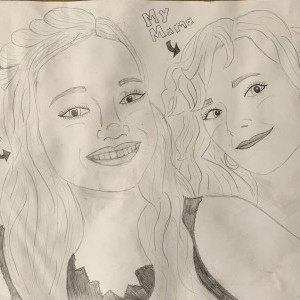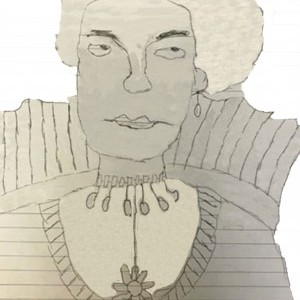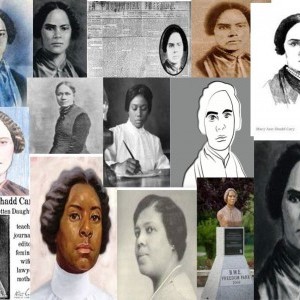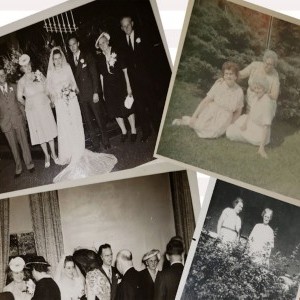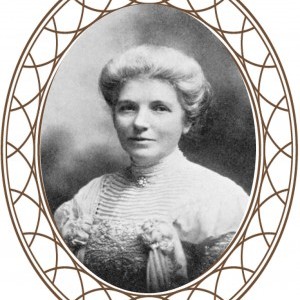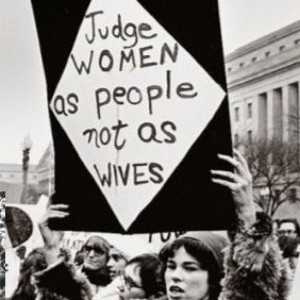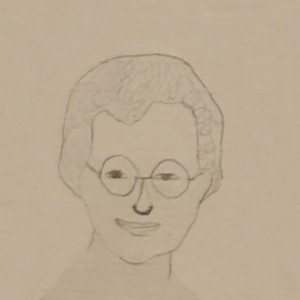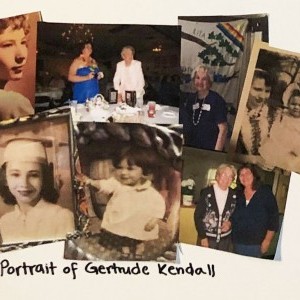Nicholas Emmons
Rutherford B. Hayes High School | Delaware City, OH | 10th Grade
Inspirational Family Member
My Grandmother from Italy
My grandmother Giovanna DiCesar lived in Introdacqua, Italy and was only 14 when she made her voyage to the United States. Her mother, Aldovina, never made her trip to the US. Her father, Pansilo, worked on the Norfolk Railroad in Pennsylvania. Before moving to the United States permanently, he went back to Introdacqua to marry Aldovina. Giovanna’s brother had made the trip only six months prior to her. Before making the journey to the US, Giovanna was not too sure if she would like it in the new and unfamiliar place. Soon the day came when she would have to face her fears.
On June 10, 1954, she and her two cousins boarded the Conte Biancamano. The journey lasted 12 days with a stop in Canada to rest. On June 24, they saw Ellis Island and went through the immigration process. She then moved into an apartment in New York with her aunt Felecieta and other Italians in her apartment area. Seven years passed by as Giovanna lived in New York. She was now 21 and able to vote in elections for Congress and Senate. But when the time came to vote, she did not. Voting for congress was not as big of a deal for her since she had recently immigrated. She did not know of the hardship and oppression that countless women had suffered through to secure their vote. Voting was not as big of a deal to Giovanna and so she focused on supporting herself and her family. Three more years passed.
It is now 1964 and the presidential election is around the corner. It is such a big event, even Giovanna votes. She heads to the nearest place to vote with her friends and waits her turn. Giovanna casts her vote for the first time in the US that day, but she does not realize how she was able to, or that countless women before her were not able to do the same.
Historical Figure I Admire
Rose Scott
Rose Scott, an Australian women's rights activist was born on October 8, 1847. Rose was the daughter of Ann Scott and Helenus Scott. Rose was the fifth of eight children, and was raised at home with her siblings. Starting in 1882, Rose began holding salons at her home in Sydney, Australia. She became well known by politicians, judges, philanthropists, writers and poets by holding her salons. Later, in 1889 she helped in founding the Women’s Literary Society, which became the Womanhood Suffrage league in 1891. Rose regularly spoke on committees, this shaped her into a confident, witty, and accomplished public speaker. Rose’s mother, Ann Scott, died in 1896. Scott’s interest in women’s voting right led to much research being done and eventually led to the closing act of 1899. Scott also helped with getting women hired in police stations, and as inspectors of factories and shops. She also helped improve conditions of women prisoners.
Scott then founded and became the first president of the Women’s Political Education League in (1992). She held office for eight years, (1910). The league constantly campaigned for an issue felt greatly by Rose, which was raising the age of consent to 16. This was achieved in 1910 with the Girls' Protection Act. Scott also held the position of president at the Sydney Branch of the Peace Society in 1908. Scott continued to participate in women's rights movements such as “Family Maintenance and Guardianship of Infants” in 1916, “Women’s Legal Status” 1918 and “First Offenders (Women)” 1918 Acts.
When she retired in 1921, she was given grant money which she used to found a prize for female law student at the university. Rose’s portrait was painted by John Longstaff and hangs in the art gallery at Sydney. On April 20, 1920, Rose Scott died from a painful illness in her home, Lynton, on Jersey Road, Woollahra.
CONTEXT –
Rose Scott lived from 1847 to 1920. She was highly influenced by the oppression of women in the society and the deprivation of knowledge, which is why she most likely held salons for information and to share her ideas on politics. In this time period it was thought that women should not worry about politics and news in general, that it was for the men to vote and be political. With her foot in the political door, with her holding salons, there was a perfect opportunity for her to express her feelings on the oppression of women and make some change in the legislature, which she immediately jumped on. With her support of salons, Scott would become a confident speaker and learn how to express ideas and thoughts. Scott would then speak on committees and boards to express her ideas on Australian patriarchy.
CONTRIBUTION –
In Scott’s lifetime, she was able to impact the lives of so many women in Australia. She was a huge advocate for women’s rights and got a lot of things changed. Scott helped found the Women’s Literacy Society, and the Women’s Political Education League. With the Women’s Political Education League, she was able to help make great changes in Australia in the form of acts and laws, including raising the age of consent to 16, and the early closing act, which made it so that women would not have to work so late hours at jobs. Scott also made changes in the workforce, enabling women to work at police stations, and as inspectors. She also improved the conditions for female prisoners. That's not all, after her presidency at the league Scott continued to participate in campaigns for women such as Family Maintenance and Guardianship of Infants” in 1916, Women’s Legal Status (1918) and First Offenders (Women) 1918 Acts. And at her retirement she gave a great amount of money to the university as a prize for female law students.
What the Project Means to Me
A Different View On Voting –
To understand where the future is headed, you have to look to the past. While researching the past of my grandmother, I discovered heaps of information that was unknown to me and others in my family. It was interesting talking to my grandmother and asking her questions. Despite not remembering some details, it was insightful nonetheless. None of us had any real idea on what we knew about my grandmother Giovana. While researching, we found passports, dates, stories of her voyage and other information not known to us. To know the past is one thing, and to truly understand it is another.
Giovana always talked about the importance of loving your family because once people are gone, they are gone. She said that was why she never voted before the presidential election. She only cared about supporting her family and not about politics. Giovanna never thought of voting being a gift. Since she was born and raised in Italy and most of her education was about Italy, she never knew about the women's suffrage movement in the US.
Researching my grandmother and Rose Scott enabled me to understand more of our history, especially when it comes to women’s suffrage on our continent and another. One experience not knowing the privilege of voting, and the other taking it for granted. Looking back at my completed project, I now realize the importance of voting on all sides and all levels and understand what it took to get us here as a society and a race as a whole.
Explore the Archive
More From This Class
Click on the thumbnails below to view each student's work.Deadline Extended
There's still time to join Women Leading the Way.
Become a part of our storytelling archive. Enroll your class today.
Join the Project

